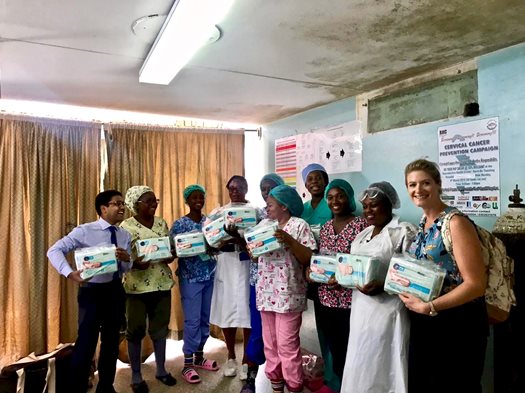Mater Researcher Associate Professor Samudragupta (Sam) Bora’s passion for improving long term health outcomes for children saw him travel to Ghana, Africa to conclude the initial phase of his world first research into placental transfer of malaria on infant neurodevelopment, build capacity of local health providers and distribute Mater gifts.
Malaria has a significant impact on health across the world with 435 000 malaria deaths worldwide and close to 11 000 in Ghana alone in 2018 according to the World Health Organisation*. In pregnant women, malaria increases the risk of maternal death, miscarriage, stillbirth and low birth weight, as well as the associated risk of neonatal death.
A/Prof Bora’s research led him to Korle Bu Teaching Hospital in Accra where more than 300 women had their placentas examined for signs of malaria infection, followed by a neurodevelopmental assessment of their newborns over a four-month period.
“Malaria is one risk factor, but my research program is not specifically about malaria. Anything that affects the development of the newborn brain and consequently adverse child outcomes is what I’m interested in,” A/Prof Bora said.
“We want to learn how to look after these mothers when they get pregnant and how to make sure there’s minimum harm to the developing fetus,” he said.
The successful completion of this phase of research is a clear testimony to the power of teamwork and partnership.
“Such an ambitious endeavour would have never been possible without the commitment, expertise, and generosity of our collaborators and team based at Korle Bu. At the same time, the unique expertise of our team based at Mater was equally critical to address this important child health research question,” A/Prof Bora said.
During A/Prof Bora’s visit he gave two grand rounds lectures in obstetrics and gynaecology and child health that were attended by physicians, nurses and specialist trainees.
His most special role was to supply Mater Mothers’ Hospitals created baby products and Mater Foundation gifts to Korle Bu Teaching Hospital maternity, neonatal intensive care and paediatric wards.
“Giving Mater nappies to the maternity wards or Miracle Max toys to the paediatric wards is just something small but I was humbled to share something from our hospital with them,” A/Prof Bora said.
The research is supported by Mater Foundation and A/Prof Bora is incredibly grateful for their commitment to the research studies he is leading to improve child health outcomes in Australia and worldwide.
A/Prof Bora collaborated with Professor Sailesh Kumar, Professor Helen Liley and doctoral trainee Ms Harriet Lawford on the research project.
A/Prof Bora is Group Leader, Neurodevelopmental Follow-Up and Outcomes at Mater Research Institute—The University of Queensland (MRI-UQ) and Chair of Executive Committee of the Perinatal Society of Australia and New Zealand (PSANZ) Long-Term Outcomes of High-Risk Babies Subcommittee.
*World Health Organisation World Malaria Report 2018 https://www.who.int/malaria/publications/country-profiles/profile_gha_en.pdf?ua=1
